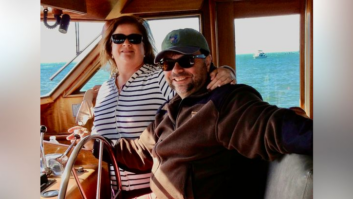The road ahead for Audacy is coming into sharper focus after it gained FCC approval for its station transfers and now has emerged from bankruptcy.
Audacy said Monday in a press release it has implemented a “fully consensual, deleveraging transaction that equitized approximately $1.6 billion of funded debt, a reduction of 80% from approximately $1.9 billion to $350 million.”
A new board is expected to be seated soon. The company said David Field, its current president/CEO, will continue in that position, according to the press release, and the existing management team remains in place.
Also, in conjunction with the completion of this restructuring, Audacy said it is expected to become a private company.
Field says the company is pleased to have achieved its restructuring goals.
“Audacy embarks on our next chapter, capitalizing on our position as a scaled, multi-platform audio leader, differentiated by our exclusive, premium audio content, including our unrivaled leadership in sports audio, powered by our industry-leading financial strength and focused on accelerating our innovation and digital transformation. We are maximizing a broad set of opportunities to further accelerate our growth for the benefit of Audacy and all of its stakeholders,” Field said in the prepared statement.
Its successful financial reorganization, according to observers, may mark a new beginning, but the media company continues to face a challenging economic environment.
Craig Huber of Huber Research Partners told Radio World, “Normally what happens post bankruptcies in radio sector, is the new owners – the debt holders in this case – step up the cost cutting even further at the organization, change out management and the board, and try to accelerate transition of the business model away from the legacy model. Much easier said than done, of course.”
Huber said there are “no easy answers for Audacy, but at least the debt burden will be significantly less than it had been.”
It is also “very common” for companies that emerge from bankruptcy to become privately held, Huber said. It’s not clear when Audacy will cease to have its stock traded publicly but it’s on that path. It continues to trade over the counter with the stock symbol AUDAQ.
Radio industry blogger Jerry Del Colliano wrote last week that the new Audacy could look to add digital assets, “but radio has had a disappointing relationship with digital ventures and (Alex) Soros knows little about digital and linear media.”
Del Colliano referred to Alex Soros, who runs Soros Fund Management. The fund is a major investor in Laurel Tree Opportunities Corp., the new majority owner of Audacy with approximately 41% of the company. Alex Soros is the son of billionaire philanthropist George Soros.
Del Colliano, editor of the online Inside Music Media newsletter, had been critical of David Field and his leadership. He speculates what the Soros-led company will do moving forward.
“Look at this thing like the hedge fund manager Soros is; build it, throw more debt on it, cut costs, fire people and sell assets, make a profit or write off the losses,” Del Colliano wrote in his newsletter.
Audacy, which operates 220 radio stations in 45 markets, blamed a “perfect storm of macroeconomic challenges” for the bankruptcy in January 2024. But Audacy had been swamped with debt since the 2017 acquisition of CBS radio that brought with it $1.5 billion in new debt, analysts said at the time. At the time the company was known as Entercom.







